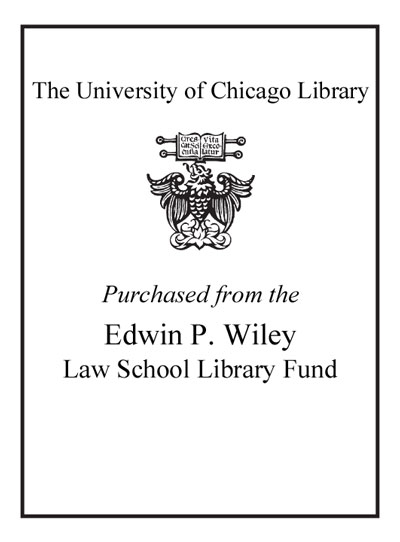Principles of criminal law /
Saved in:
| Author / Creator: | Ashworth, Andrew. |
|---|---|
| Edition: | 5th ed. |
| Imprint: | Oxford [England] ; New York : Oxford University Press, c2006. |
| Description: | xxvii, 508 p. ; 25 cm. |
| Language: | English |
| Subject: | |
| Format: | Print Book |
| URL for this record: | http://pi.lib.uchicago.edu/1001/cat/bib/6000205 |
Table of Contents:
- Table of Cases
- Table of Conventions
- Table of Legislation
- 1. Criminal Justice and the Criminal Law
- 1.1. The Contours of Criminal Liability
- 1.2. The Machinery of English Criminal Law
- 1.3. The Sources of English Criminal Law
- 1.4. The Criminal Law in Action
- 1.5. Outline of the Aims and Functions of the Criminal Law
- 1.6. The Criminal Law and Sentencing
- 2. Criminalization
- 2.1. The Politics of Lawmaking
- 2.2. The Principle of Individual Autonomy
- 2.3. The Principle of Welfare
- 2.4. Harm and Minimalism
- 2.5. Assessing the Seriousness of Offences
- 2.6. Morally Wrong Behaviour
- 2.7. Criminalizing Omissions
- 2.8. Minor Harms
- 2.9. Remote Harms
- 2.10. Victimless Crime
- 2.11. Conclusions
- 3. Principles and Policies
- 3.1. Rules and Principles
- 3.2. Constitutionality and Codification
- 3.3. Human Rights and Criminal Law
- 3.4. The Range of the Criminal Law
- 3.5. The Rule of Law and Fair Procedures
- 3.6. Principles Relating to the Conditions of Liability
- 3.7. Conclusions
- 4. Criminal Conduct
- 4.1. The General Part of the Criminal Law
- 4.2. Involuntary Conduct
- 4.3. Acts, States of Affairs, and Possession
- 4.4. Omissions
- 4.5. Personality
- 4.6. Causation
- 4.7. Justifiable Conduct
- 4.8. Chastisement of Children
- 4.9. Justifications, Necessity, and the Choice of Evils
- 4.10. Conclusions
- 5. Positive Fault Requirements
- 5.1. The Issues
- 5.2. Some General Principles
- 5.3. Varieties of Fault
- 5.4. The Variety of Fault Terms
- 5.5. The Referential Point of Fault
- 6. Negative Fault Requirements
- 6.1. Excuses and Denials of Responsibility
- 6.2. Agency, Capacity, and Mental Disorder
- 6.3. Intoxication
- 6.4. Duress and Necessity
- 6.5. Reasonable Mistake and Putative Defences
- 6.6. Ignorance or Mistake of Law
- 6.7. Entrapment
- 6.8. Reviewing the Non-Justificatory Defences
- 7. Homicide
- 7.1. Death and Finality
- 7.2. The Conduct Element: Causing Death
- 7.3. Defining Murder: The Inclusionary Question
- 7.4. Defining Murder: The Exclusionary Question
- 7.5. 'Involuntary Manslaughter'
- 7.6. Endangerment on the Roads
- 7.7. Endangerment in Other Situations
- 8. Non-Fatal Violations of the Person
- 8.1. Varieties of Physical Violation
- 8.2. Reported Physical Violations
- 8.3. Offences of Non-Fatal Physical Violation
- 8.4. Reported Sexual Assaults
- 8.5. Non-Consensual Sexual Penetration
- 8.6. Offences Against the Vulnerable
- 8.7. Other New Sexual Offences
- 8.8. Re-Assessing Sexual Offences Law
- 9. Offences of Dishonesty
- 9.1. Introduction
- 9.2. The Offence of Theft
- 9.3. Taking a Conveyance Without Consent
- 9.4. Robbery
- 9.5. Blackmail
- 9.6. Burglary
- 9.7. Handling Stolen Goods
- 9.8. Deception Offences
- 9.9. Fraud Offences
- 9.10. Dishonesty, Discretion, and 'Desert'
- 10. Complicity
- 10.1. Introduction
- 10.2. Distinguishing Principals from Accessories
- 10.3. The Conduct Element in Complicity
- 10.4. The Fault Elements in Complicity
- 10.5. Accessorial Liability for Different Results
- 10.6. Derivative Liability and the Missing Link
- 10.7. Special Defences to Complicity
- 10.8. Conclusions
- 11. Inchoate Offences
- 11.1. The Concept of an Inchoate Offence
- 11.2. The Justifications for Penalizing Attempts at Crimes
- 11.3. The Elements of Criminal Attempt
- 11.4. The Justifications for an Offence of Conspiracy
- 115. The Elements of Criminal Conspiracy
- 11.6. Incitement
- 11.7. Voluntary Renunciation of Criminal Purpose
- 11.8. The Relationship between Substantive and Inchoate Crimes
- 11.9. The Place of Inchoate Liability
- Bibliography
- Index

